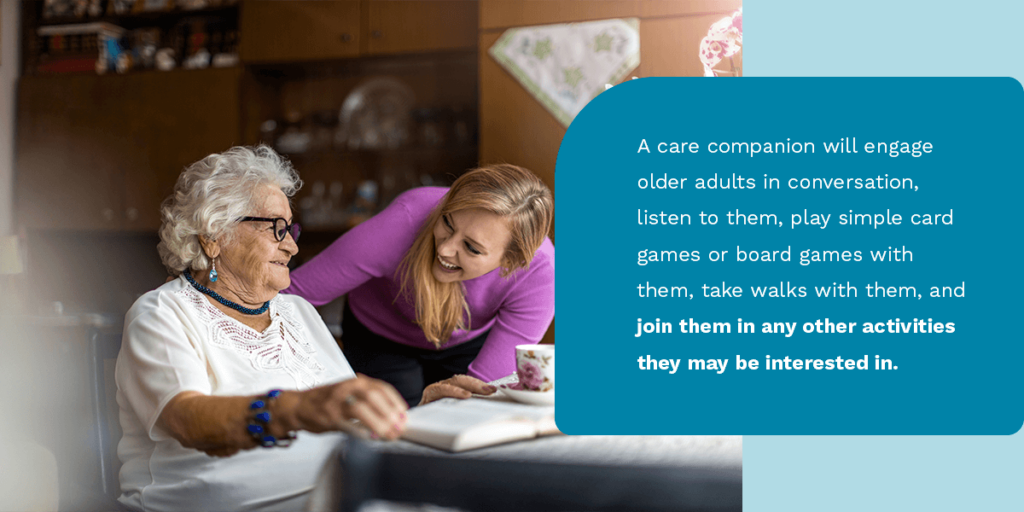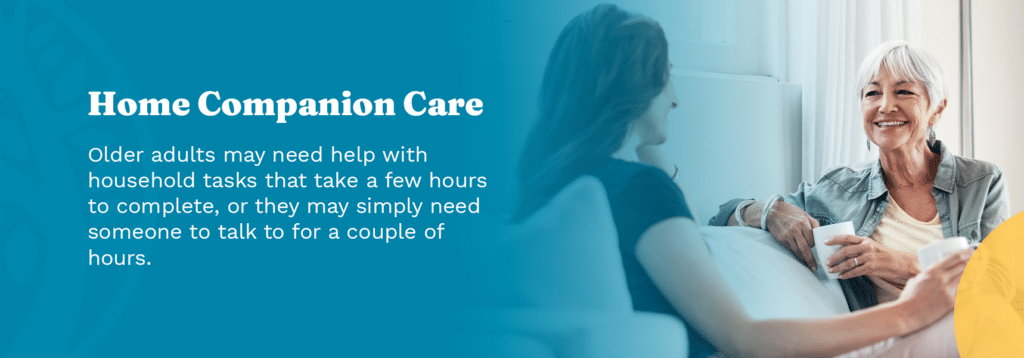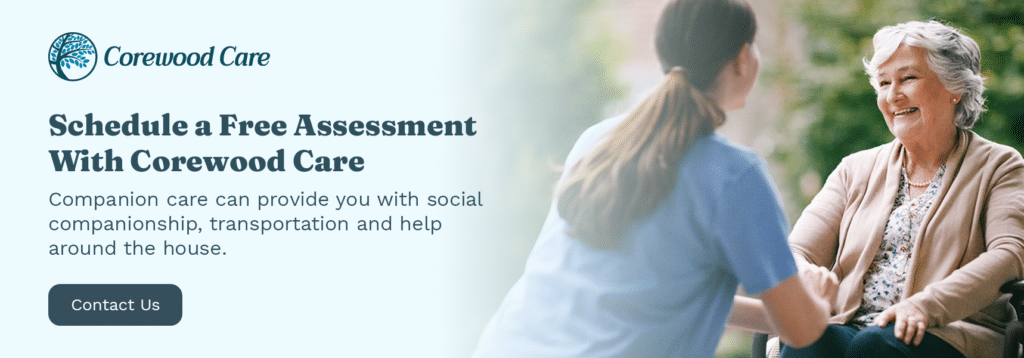What Is Companion Care?

Companion care is a type of non-medical care for older adults. Companion care can be defined as providing socialization and emotional support. However, care providers can also help with custodial care services such as running errands, doing light housekeeping, performing household chores, planning activities, scheduling appointments, cooking meals, providing transportation and more. Companion care allows older adults to remain in their homes while receiving care.
Socialization is a basic human need, but it’s harder for aging adults to meet with friends and family for various reasons. This is where companion care providers can step in and offer support. While companion care is not a medically necessary service, it can significantly impact an individual’s health.
Loneliness, depression and anxiety can bring about health complications such as high blood pressure and heart conditions. More than that, loneliness and isolation can contribute to increased risk for dementia, type 2 diabetes, suicidal ideation, addiction and premature death. Social isolation increases the risk of dementia by 50%, heart disease by 29% and stroke by 32%. Studies also show that nearly one in every four adults aged 65 and older experience social isolation. Companion care can help prevent these conditions and support an individual’s mental health.
How Does Companion Care Work?
Older adults can receive companion care formally or informally. Friends or family members can informally provide companion care by visiting and helping with household chores. Local organizations and home care agencies provide companion care on a formal, paid basis.
Care providers often assess an individual’s needs prior to providing services. This assessment allows them to determine what type of care is best for the individual, when they will need care and what type of services they’ll require.
A companion will engage older adults in conversation, listen to them, play simple card games or board games with them, take walks with them and join them in any other activities they may be interested in. They also provide transportation for errands, appointments or other activities. In some situations, they may cook for individuals or perform light household tasks that older adults struggle with.

When working with a home care agency, the agency will schedule the companion care provider for weekly visits, while others may benefit from two to three visits per week. Some individuals may require daily visits because they need help with everyday tasks.
Companion caregivers also keep family members informed. They communicate with other care professionals and family members to ensure older adults receive the care that’s best for them. Care team members use their time with individuals to monitor their physical, mental and emotional well-being to create personalized care plans tailored to each person’s needs.
What Sets Companion Care Apart?
It’s a common misconception that personal care and companion care are synonymous services that offer the same and cost the same. While these are both home care services, you might find one to be more beneficial than the other, depending on your family member’s specific needs.
While companion care focuses on providing social support through companionship, personal caregivers provide hands-on care for individuals who need more assistance with day-to-day living. This type of care is focused on activities of daily living (ADLs). Personal caregivers might assist with tasks like feeding, bathing, dressing, hair care, toilet assistance, basic grooming, medication reminders, mobility and transportation, and more.
Personal care enables aging adults to receive the daily support they need from the comfort of their homes. It is often a great option for older adults who need consistent, constant care. Companion care is a better option for older adults experiencing social withdrawal or who are having trouble staying on top of household chores and other daily tasks.
Benefits of Companion Care
Companion care benefits older adults in various ways. It provides companionship, emotional support and improved quality of life. When older adults live alone and struggle to leave their houses, they often experience isolation and loneliness. They may not be able to meet with friends or visit family often.
Companion care providers can alleviate this loneliness by spending time with care recipients and providing engaging conversation. They provide social connection, which is vital for a person’s health and overall well-being. Humans are wired for connection, and social interaction has the following health benefits:
- Improved mental health
- Decreased depression symptoms
- Reduced rates of anxiety
- Higher self-esteem
- Strengthened immune systems
- Lower risk of heart disease
- Lower blood pressure
Lack of social interaction negatively impacts one’s health and can lead to increased mortality rates. Companion care can help older adults live longer, healthier, more fulfilled lives. Companionship helps people feel understood, welcomed, valued and close to another person.
In addition to spending time with care recipients, companionship providers can help them remain engaged and active in their community. Care providers can transport them to senior centers, community centers and other locations that offer activities for older adults. They can also help individuals plan fun activities such as going to movies, shopping, sightseeing and visiting friends. They can help keep older adults active and healthy by doing physical activities with them, such as walking or swimming.
Companion care can also help grieving individuals cope with the death of a spouse. Some older adults lack family members or cannot see their relatives often. When some older adults lose their spouses, they lose their primary source of companionship. In these cases, companion care can provide the comfort and support needed when a person is grieving.
Older adults living independently sometimes struggle to keep up with household tasks such as cleaning, doing laundry, cooking and running errands. Companion care providers can relieve individuals of these responsibilities by helping them complete tasks around the house or doing household chores for them. This assistance can help relieve stress and give older adults an overall better quality of life.
Companion care allows older individuals to remain independent and enjoy the comfort of their own homes. It decreases the risk of isolation and depression, increases overall happiness and mental health, relieves the stress of household responsibilities, and provides needed transportation. Older adults often look forward to visiting with companion care providers and find comfort in knowing that they have someone they can rely on for help with transportation and household tasks.
Companion care providers also create consistency for older adults. Their services become a routine for older adults and something they can look forward to. Individuals can request care at times that are most convenient for them and enjoy the comfort of counting on a reliable companion.

Signs a Care Companion Is Right for Your Family Member
Older adults who live independently are at risk of isolation and loneliness. Even if family members are able to visit them once in a while, they may require more help and companionship than their family can provide. This is when companion care services can help. Companion care is beneficial for older adults who feel isolated, struggle to keep up with household tasks, and need help getting to and from various places.
If an individual experiences forgetfulness/cognitive decline or loses their ability to drive, they may need companion care to help them get around and complete tasks around the house. Another sign that a family member may need companion care is sadness, depression, anxiety or loneliness. If an individual often expresses feelings of sadness or loneliness, or if they simply don’t seem like themselves most of the time, they may be struggling with isolation.
Some more prominent signs of loneliness in older adults are sleep disturbances, difficulty sleeping, a lack of interest in things they previously enjoyed, changes in appetite, weight loss, a decline in personal hygiene and emotional changes. Sometimes, loneliness may cause a person to express more anger rather than sadness.
Another sign that an older adult needs companion care is if their family members struggle to keep up with their care. Work, family obligations and other responsibilities can keep people busy, and they may not have adequate time to care for an aging adult. If you’re struggling with care tasks such as driving your family members to appointments, helping them with chores or entertaining them, companion care may be right for them.
Companion care can relieve family members of caring for an aging adult so they can enjoy their time with them rather than stressing over care tasks. It can also give families peace of mind that their family member is taken care of even when they can’t be there. Companion care is also ideal for older adults who don’t have many family members or friends to spend time with them.
If an individual spends most of their time alone, companion care can be a solution to reduce the isolation they feel. Companion care can be right for a person if they experience difficulties living independently but want to continue living in and receiving care in their own home.
Does Insurance Cover Companion Care?

Medicare, the government insurance program for American adults age 65 and older, does not cover companion care services. Medicare will only cover medically necessary services, and in some cases, it will cover short-term personal care if it is in combination with medically necessary services. Medicaid, the state and federal health insurance program for United States citizens with low income, offers different services based on where an individual lives. For example, Medicaid covers custodial care services in some states but not others.
Private insurance plans will sometimes cover more elder care services than Medicare and Medicaid. For example, comprehensive long-term care insurance policies will sometimes cover health services and custodial care to certain limits. For an insurance policy to cover these services, individuals must purchase this coverage before they actually need the services.
How to Choose Quality Companion Care
When searching for companion care, individuals and families should make sure they choose an agency that provides quality care. People should look for an agency with the following qualities and benefits:
- Trained, qualified and compassionate staff
- Client care plans
- Replacement staff when caregivers are unavailable
- The option for 24/7 care
It’s important that companion care providers are compassionate and trained to provide quality care. Families should check with agencies to see if they create client care plans and involve families in the plans. They should also inquire about what services an agency offers and if they have replacement staff to fill in when regular caregivers are unavailable. Additionally, if individuals need 24/7 care or may require it in the future, families should find out if an agency offers it.
How to Prepare Your Family Member for Companion Care
If you believe that companion care will benefit your family member, the next step is to sit down with them to discuss the option. Older adults who are experiencing depression, anxiety or loneliness may feel reluctant to accept care. Often, these symptoms can cloud the mind and make us not want to accept help.
Discussing companion care and being open to your family member’s thoughts, opinions and feelings ensures that they can feel a part of the decision. This way, your family member can welcome their companion caregiver and look forward to the positive change and how it will benefit them. Let them know how companion care works and what the benefits are, and then give them time to process the information before revisiting the topic.
When your family member is ready to make a decision with you, you can work together to choose quality companion care that they are comfortable with. It’s important to ensure they’re part of the process and involved in the decision-making.
Schedule a Free Assessment With Corewood Care
Aging adults need companionship to avoid depression and feelings of isolation. Companion care can provide them with social companionship, transportation and help around the house. This arrangement allows older adults to continue living independently in their own homes. Even though it’s not a medically necessary service, companionship can significantly impact mental, physical and emotional well-being. At Corewood Care, our goal is to help older adults thrive and live gracefully while receiving the necessary care.
From companion care to home health care, our compassionate, qualified staff works to create individual care plans and tailor services to each person. Every person is different, so we monitor clients’ emotional, mental and physical well-being to meet their unique needs. Contact Corewood Care to schedule a free assessment and decide if companion care is right for your family member.




